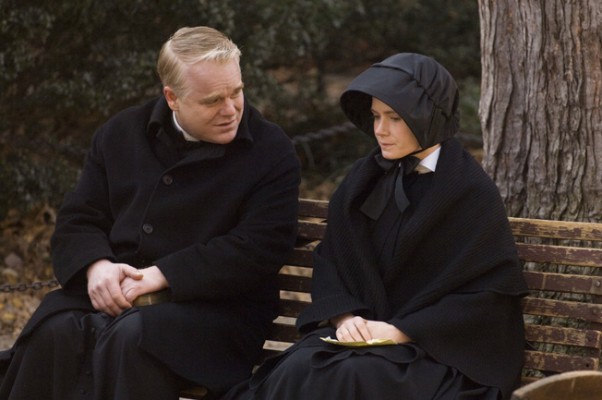Doubt’s Point Is Also Its Frustrating Flaw
Doubt
Written and directed by John Patrick Shanley from his play
Miramax, 2008
I want to come right out and say Doubt is by no means a bad film or anything that is remotely close to being something that I just wave off with my hand. And I like movies that don’t come out and say everything all the time, although I’m more of a guy (see Let the Right One In) who enjoys subtle explorations into character more than ambiguous resolutions to plot. See the title, know what you’re getting into.
At a Catholic school, Father Patrick Flynn (the always fine Philip Seymour Hoffman) is a man who is a man of God but does some things that are slightly off-kilter. This does not go unnoticed by Sister Aloysius Beauvier (Meryl Streep), the school’s principal who has been ferreting out bad behavior for years and has become constantly suspicious of everyone at all turns. She is always looking for ways to punish, and Father Flynn’s sermon about “doubt” has her thinking that the sermon has something to do with his personal life, since “all sermons come from somewhere.” Sister Aloysius has told her fellow nuns to be on alert, and an impressionable new teacher, Sister James (Amy Adams), becomes more suspicious herself despite a sweet and relatively naive nature.
A black altar boy by the name of Donald Miller (Joseph Foster) has befriended Father Flynn, who thinks the kid may need someone to lean on due to his being different. During one of Sister James’ classes, he is called to the rectory for a private meeting with the Father, and later, also under James’ watch, the Father is discovered putting a shirt in Donald’s locker. Sister James reports these findings to Sister Aloysius, not thinking they are big deals, but the strict principal has immediately put 2 and 2 together and thinks the wrong kind of relationship has occurred between Father Flynn and his altar boy.
This is where the movie starts entering its meaty scenes for actors, as Streep’s Aloysius and Hoffman’s Flynn square off in an argument that is never explicit but is lightly implied. It is something the story does a very good job of doing: it’s the 60’s, it’s a Catholic hierarchy, and men are seen as higher than women, so Aloysius’ light handling but very clear accusation is something that is very powerful. Later on, when Aloysius tells Donald’s mother (Viola Davis) what she suspects, the screwed-up nature of the male-female dynamic has Mrs. Miller in a very real confused state, one where she doesn’t want to even attempt to square off against a man even under the worst of circumstances. “Well, he’s only here ’til June,” she reasons.
I like Meryl Streep and all…I mean, you can’t have watched many of her (espcially past) performances and not coming out liking her…but I do wonder about her latest performances. They are somewhat one-note villainesses, as in The Devil Wears Prada and especially this one, where she shows no different emotion other than righteous suspicion, downright unlikeable in most ways although she does show some compassion here and there in brief instances. Also, the movie can be a bit heavy-handed with its metaphors and her character is ready to explain them to you. A light bulb goes out, a “different kind of wind” comes in and fells a branch, injuring one of the nuns, and Aloysius is there to say, “This place is falling apart!” looking to the skies for divine affirmation.
Where this movie ends up is revelatory but it also rings a bit false, and of course we’re still left with the “doubt” that the movie is, after all, about. Whether or not you enjoy this kind of debate is what this movie depends upon for its success, and I’m stuck in the middle. I think debate is a healthy thing, and I have my own interpretation of the events, but it’s hard to feel like it’s not a bit of a cop out not to give an explanation, or at the very least…have a concrete scene that we can observe and ask for ourselves, “Is this inappropriate?” This type of story seems ripe for a Rashomon-style telling. And there would still be some doubt and the theme would properly be explored.
This movie is worth it for the performances (for the most part), mostly the two scenes I mentioned above, and like I said, a healthy debate afterwards if you’re into it.
Write a comment
You must be logged in to post a comment.
